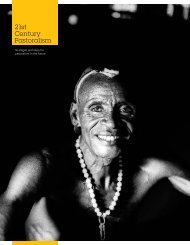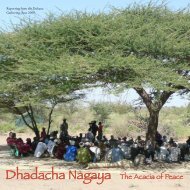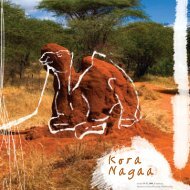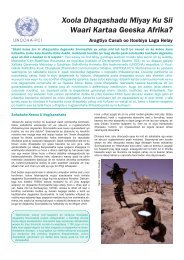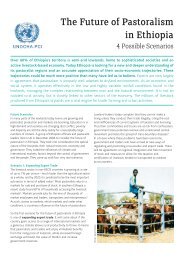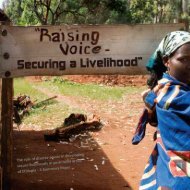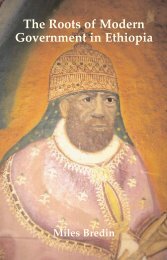Download PDF (1.47Mb) - the Website of the Pastoralist ...
Download PDF (1.47Mb) - the Website of the Pastoralist ...
Download PDF (1.47Mb) - the Website of the Pastoralist ...
Create successful ePaper yourself
Turn your PDF publications into a flip-book with our unique Google optimized e-Paper software.
ABOUT<br />
THE KARAMOJA<br />
RESEARCH<br />
7. Analysis<br />
Analysis, separating <strong>the</strong> material into its constituent elements in order to understand it better, involves<br />
four stages:<br />
• collating or organising <strong>the</strong> material in an arrangement that makes it easy to navigate or manage,<br />
• interpreting it in ways that make sense,<br />
• syn<strong>the</strong>sising it to look for generalisations and patterns,<br />
• concluding its essential messages.<br />
Unlike o<strong>the</strong>r forms <strong>of</strong> research, <strong>the</strong> analytical process in action research does not wait until all <strong>the</strong> material has<br />
been collected, but begins as early as <strong>the</strong> first meeting <strong>of</strong> <strong>the</strong> researchers. It continues throughout <strong>the</strong> discussion<br />
with each person who contributes knowledge to <strong>the</strong> research.<br />
In every settlement and kraal and in <strong>the</strong> analysis sessions back in Moroto every third day, discussions about what<br />
people were saying were already leading <strong>the</strong> team towards ideas about how to organise <strong>the</strong>ir material. They<br />
were also getting a sense <strong>of</strong> direction for interpreting what <strong>the</strong>y were finding, when <strong>the</strong>y heard what people<br />
found important and why. After 18 days out, <strong>the</strong>y returned to base for a final analysis, joined once again by John<br />
Logwee and <strong>the</strong> facilitators.<br />
The team members were anxious to do <strong>the</strong> ‘right thing’. They were concerned that <strong>the</strong> <strong>the</strong>mes that <strong>the</strong>y were<br />
hearing from people did not fit with <strong>the</strong> <strong>the</strong>mes that <strong>the</strong>y had talked about before <strong>the</strong>y had set out. At <strong>the</strong><br />
beginning <strong>of</strong> <strong>the</strong> analysis session, <strong>the</strong> facilitators began by asking <strong>the</strong>m to speak about what had surprised or<br />
struck <strong>the</strong>m in <strong>the</strong>ir visits and encounters. Team members responded with <strong>the</strong> issues that had <strong>the</strong> greatest<br />
resonance or were most <strong>of</strong>ten repeated. In this way, <strong>the</strong> team established <strong>the</strong>mes for analysis based on <strong>the</strong>ir<br />
actual encounters ra<strong>the</strong>r than on categorisations that <strong>the</strong>y had imagined before <strong>the</strong> interviews.<br />
The first surprise <strong>the</strong>y mentioned was that many people <strong>the</strong>y met felt that NGOs were disconnected from <strong>the</strong> real<br />
life <strong>of</strong> <strong>the</strong> people. Was what <strong>the</strong> young researchers doing any different from all <strong>the</strong> o<strong>the</strong>rs who had come before?<br />
People complained that <strong>the</strong>y never saw any result from those visits by outsiders. The young people replied that<br />
this research was different; it was for Karimojong young people and <strong>the</strong>y, <strong>the</strong> team members, were Karimojong<br />
youth too. They made promises to bring <strong>the</strong> results back.<br />
Collating<br />
The team members decided to collate <strong>the</strong> material in a way that would help in keeping that promise while also<br />
communicating to NGOs, government and <strong>the</strong> world outside <strong>the</strong>ir own. They needed to make <strong>the</strong>ir findings clear<br />
to and verifiable by Karimojong. They decided to organise and present <strong>the</strong>ir findings settlement by settlement,<br />
using numerous pictures, direct quotes and stories. Their approach would respect <strong>the</strong> Karimojong way <strong>of</strong> rooting<br />
analysis in <strong>the</strong> concrete reality <strong>of</strong> people and places. It would make <strong>the</strong> material easy to navigate and <strong>the</strong> findings<br />
trustworthy.<br />
- 14 -



